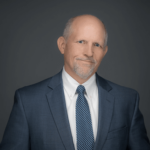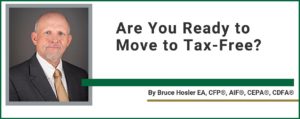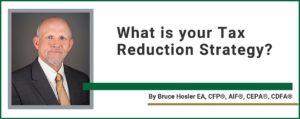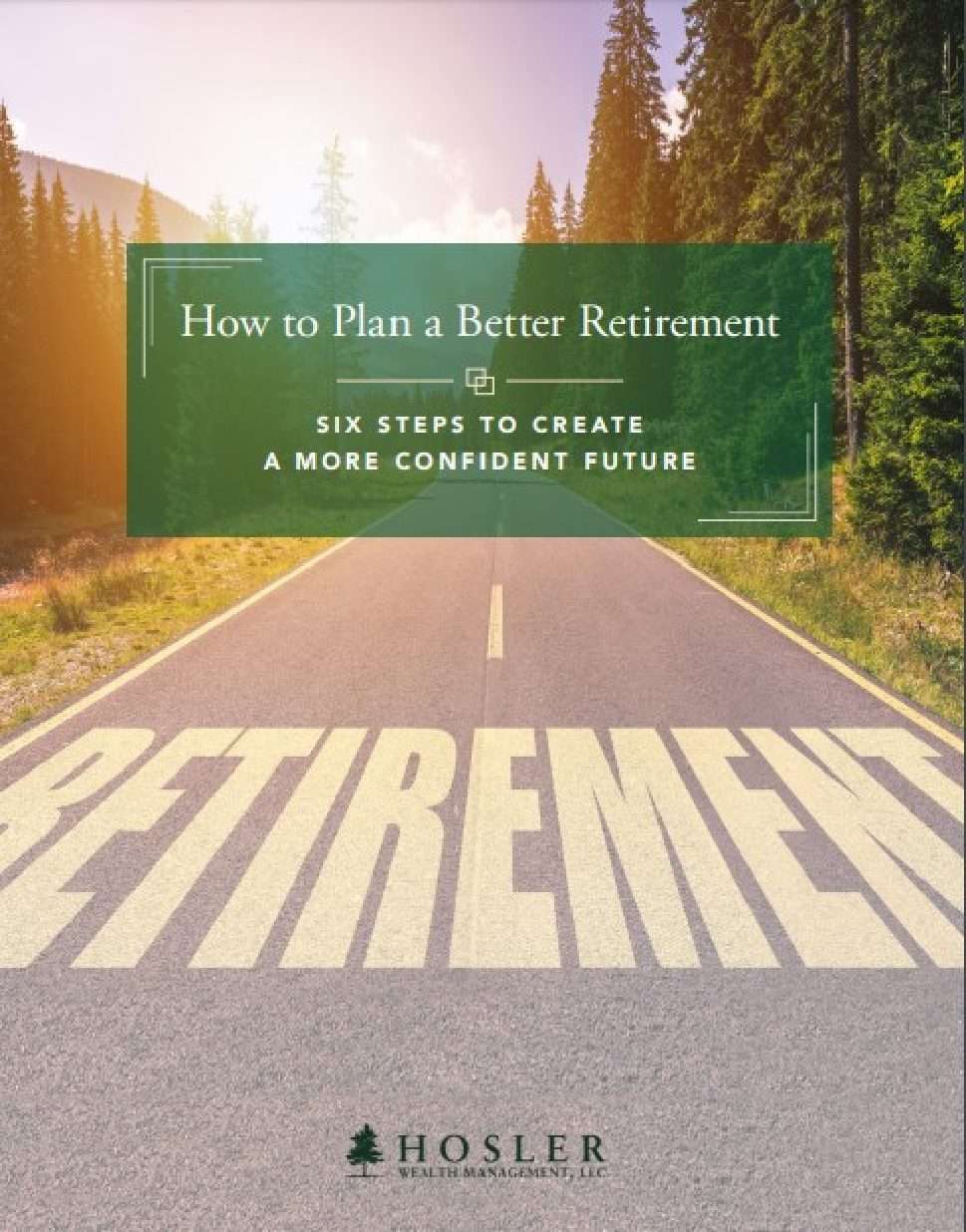In our first episode, Bruce Hosler of Hosler Wealth Management sits down with co-host Jon Gay to explain the term “tax-free.” What does it really mean?
When you’re looking at retirement income, you don’t want that income to be taxed at the federal or state level. Furthermore, you don’t want it to count as provisional income against your social security.
Bruce takes us through some different vehicles he and his team employ here – including Roth IRAs and life insurance retirement plans.
With the large government spend on COVID relief, and the Tax Cuts and Jobs Act set to expire, taxes are likely to go up. That’s why it’s beneficial to employ someone like Bruce Hosler and his team at Hosler Wealth Management to protect and preserve your wealth.
For more information about anything related to your finances, contact Bruce Hosler and the team at Hosler Wealth Management.
Call the Prescott office at (928) 778-7666 or our Scottsdale office at (480) 994-7342.
To listen to more Protecting & Preserving Wealth podcast episodes, click here.
Limitation of Liability Disclosures: https://www.hoslerwm.com/disclosures/#socialmedia
Podcast Host

Bruce Hosler is the founder and principal of Hosler Wealth Management, LLC., which has offices in Prescott and Scottsdale, Arizona. As an Enrolled Agent, CERTIFIED FINANCIAL PLANNER™ professional, and Certified Private Wealth Advisor (CPWA®), Bruce brings a multifaceted approach to advanced financial and tax planning. He is recognized as a prominent financial professional with over 27 years of experience and a seven-time consecutive *Forbes Best-In-State Wealth Advisor in Arizona. Bruce recently authored the book MOVING TO TAX-FREE™ Strategies For Creating Tax-Free Retirement Income And Tax-Free Lifetime Legacy Income For Your Children. www.movingtotaxfree.com.
In the Protecting & Preserving Wealth podcast, Bruce and his guests discuss current financial topics and provide timely answers for our listeners.
If you have a topic of interest, please let us know by emailing info@hoslerwm.com. We welcome your suggestions.
*2018-2024 Forbes Best In State Wealth Advisors, created by SHOOK Research. Presented in April 2024 based on data gathered from June 2022 to June 2023. 23,876 were considered, 8,507 advisors were recognized. Not indicative of advisor’s future performance. Your experience may vary. For more information, please visit.
Transcript
Jon “Jag” Gay: Welcome into episode number one of the Protecting & Preserving Wealth podcast. My name is Jon Jag Gay. I’m joined by Bruce Hosler from Hosler Wealth Management. Bruce, great to be with you.
Bruce Hosler: Thank you, Jon. Great to be with you.
Jon: Our first episode is a phrase that got my antenna up. It perked my eyes and my ears and the hairs in the back of my neck when I saw the phrase, and that is “tax-free.” I like the sound of that. What does “tax-free” mean?
Bruce: Well, tax-free has to qualify in certain special ways. First and foremost, it has to be free of federal income tax. It cannot be taxed by the state. And finally, we do not want that income included as provisional income. Uh, which would make your social security taxable.
Jon: I’m going to go out on a limb here and say the IRS doesn’t have an actual, a phrase or bucket or section 747.3 or whatever the number is about tax-free. So, explain how we kind of bridges that gap?
Bruce: So, in the code, there’s no such thing as “tax-free.” Now they talk about tax exempt and a lot of people are familiar with tax-free municipal bonds.
But tax-free in my definition is, I don’t want the clients to trigger anything that would make their other income more taxable or be taxable to them. So we’re trying to get them to a zero tax rate. And they have to have tax-free investments and vehicles to do that, or strategies that generate tax-free sources of income.
Jon: I’ve got to imagine Bruce, that a lot of folks, when they come to you and they start working with you and your team, they’re concerned about income and bringing money in and bringing revenue in. And I have to imagine that they don’t always take it to the next level and think about the tax implications of the decisions they’re making.
Bruce: Exactly. So, they think about what money do I need and where can I get it from? But they don’t think necessarily all through the consequences. So, for example, if you have income that just triggers you a couple of dollars across the threshold, your social security, that was 100% tax-free now becomes 85% taxable.
Jon: Wow!
Bruce: So, if a couples getting $40,000 or $50,000 dollars a year, you just added 30 or $35,000 worth of taxable income, by having too much taxable income.
Jon: So what you’re saying is 85% of that social security income can be taxed if you don’t plan this accordingly.
Bruce: Correct. If you’re close to the threshold, it could be very expensive.
Jon: And everybody’s situation is different, but is there a general number that you’re looking at when it comes to crossing that threshold into social security?
Bruce: Yes Jon, unfortunately, if you’re a married couple filing joint, it starts taxability at $32,000, and goes to $44,000 at about 50%, and then you cross over that threshold where 85% of your income can be included in taxable income. And now the social security is 85% taxable where it was 100% tax-free prior to that.
Jon: So for our listeners, I just want to double back here and explain provisional income is what’s used to determine if the social security benefits are going to be taxed. You want to limit that provisional income that can affect the social security. Do I have that right?
Bruce: That’s correct. And it can include one half of your social security plus almost any other taxable income that you may have, but ‘tax-free’ income is not included in that calculation.
Jon: Bruce, can you give me some examples of income that would be considered tax-free or tax exempt that’s not going to hurt you on the back-end here?
Bruce: So a couple of the primary vehicles that we use to help clients create their war chest of retirement income, that’s going to be income tax-free, are a couple of workhorses.
The primary workhorse is going to be the Roth IRA.
Jon: Yes.
Bruce: And the Roth IRA is only available through contributions or through amounts that you have converted from an IRA or perhaps from your 401k retirement plan. That’s your first workhorse that’s income tax-free. No federal, no state, not included in provisional income.
The second workhorse is the life insurance retirement plan and the life insurance retirement plan takes a cash value. Notice, I didn’t say whole life, but a cash value life insurance policy and turns it upside down and buys the least amount of death benefit and over funds for the most amount of growth.
And we use those vehicles to generate tax-free proceeds that are not includable in federal state or provisional income. And those are the two workhorses that help the basis for most people to have tax-free income.
Jon: So, ah, life insurance, I know is probably going to be a future podcast episode because there’s a lot of layers and levels and types of life insurance that we can get into.
Bruce: Absolutely.
Jon: But I want to come back to the Roth for a second, because for those of our listeners who might be new to retirement planning and financial planning, this is such an incredible tool. Make sure I have this right with you Bruce. So, a Roth you’re going to pay the taxes on the way into the Roth, or when you convert traditional retirement accounts to a Roth.
Bruce: And once you do that, everything that you put in, the growth is tax-free and then provided you meet the distribution requirements as far as how long it’s been in there and how old you are, you’re going to pull that money out tax-free. You’ve already paid the taxes on the way in, and then you’re going to pull out that principal, plus all your growth tax-free.
For the rest of your life, for the rest of your wife, her husband’s life.
And, if you have children, if you haven’t spent it, for their lives, at least for 10 years after your death. That’s what we’re looking for is that tax-free growth.
Jon: And another benefit of the Roth is we don’t know, and we’re talking about this in a future episode as well, but we don’t know for certain what’s going to happen to taxes and tax rates and tax brackets in the coming years. We can’t legally say, we don’t, we can’t make a prediction here.
Jon: But if you look at the writing on the wall, the government just spent how many trillion dollars out of necessity on COVID relief, they need to make some money back in addition to the debt they had prior to COVID. So again, we can’t guarantee, we can’t say for certain, the taxes are going to go up, but when you start looking around what’s happening in DC, things could be headed in that direction.
Bruce: Absolutely. There is one thing we do know that is guaranteed. If Congress does not do anything, the Tax Cuts and Jobs Act of 2017, sunsets on December 31st, 2025. And in 2026, we go back to the prior tax rate and that’s a higher tax rate on average for most tax brackets of at least four to 8% higher than what the current tax rates are.
So, depending on where you’re at, you’re almost guaranteed, unless Congress makes a change and extends that, you’re guaranteed a tax increase in 2026.
Jon: 2017, and the world that we’ve lived in, seems like a lifetime ago.
Bruce: Exactly.
Jon: But that was what president Trump passed, The Tax Cuts and Jobs Act, which cut the tax at the time, but did have that sunset clause in it.
So, that is important to remember. So Bruce, we’ve talked about how tax-free income is not counted toward the calculation on paying tax on your social security, but there’s also other benefits to it as well, right?
Bruce: Absolutely. The first one that comes to mind for a lot of my clients is, hey, “What if I don’t want to take a required minimum distribution from my IRA?”
Well, guess what folks, if you have a Roth IRA, there’s no required minimum distribution. You don’t have to take that out. You can hold that as long as you will. And I would submit to you that that Roth IRA is the most sacred money you have. That’s the last bucket that you probably want to pull money out, unless, unless we’re strategically planning to keep you in a zero tax bracket and we need to take it up earlier, rather than another taxable bucket. So you don’t pay taxes on your social security benefits needlessly.
Jon: So, I want to come back to that point because it’s really important. If you think about this from the government’s perspective, the reason for the required minimum distributions in a traditional retirement account is that the government wants their money.
You’re going to pay taxes on that traditional retirement account when that money comes out. But as we mentioned a moment ago, so a Roth you’ve already given uncle Sam has cut. You’ve already paid the taxes on the way in. That’s why you’re not required to take it out. The government doesn’t care how long you let it sit in there because they’ve already got their, uh, their pound of flesh, right?
Bruce: On the Roth IRA, that’s exactly right. On the traditional IRA, they are rubbing their hands together and they can’t wait till you have a required minimum distribution.
Jon: Uh.
Bruce: They’ ve loved clients making the Roth conversion because they get paid the taxes on that earlier. So here’s a win-win, the client gets the best deal.
They get tax-free growth for the rest of their lives. The government gets their money earlier. And really, the beauty to the client is – they finally know for once and for all, how much they owe taxes on that Roth – ZERO. Prior to that, they don’t know what the tax rates going to be when they have to take RMDs. They don’t know what their other income is going to be that year,
so they have a big unknown as to what tax rate they’re going to have to pay on that traditional IRA.
Jon: I like what you said Bruce, about the money being sacred. That is so, what are some other income sources that can cause issues on the tax side?
Bruce: One of the problems that we have is if you have successfully saved and have a pension or you have some rental property, unfortunately, these vehicles may make your social security taxable.
And you know, there’s not a lot we can do about that, getting you to the zero tax bracket, but, we can minimize your taxable income. But those type of vehicles – pensions, rental property or other sources of income, where they’re going to be taxable income, there’s just not a lot we can do to get you to the zero tax bracket in those cases.
But taxes certainly are going to go up in the future with these higher interest rates that are coming right now.
Jon: Sure.
Bruce: The government’s going to have to pay a higher interest rate on the debt we have and sooner or later they’re going to come with their hat out, looking for that money.
Jon: I just have this visual of Uncle Sam taking that big hat off and literally having hat in hand and being like, okay, time to pay up.
Bruce: It’s a big deep hat, isn’t it. It’s going to take a lot of money to fill that sucker.
Jon: You’ve heard of a 10 gallon hat, this is more of a 20 or a 30 gallon hat, it could be in some cases.
Bruce: Right. Exactly.
Jon: So to your point Bruce, not everybody can get to completely tax-free. They’re going to have some of these other vehicles that can contribute to what they’re going to pay in taxes, but that’s why you limit the tax liable on the other side, and that’s sheltering in some of these ‘tax-free’ vehicles, right?
Bruce: Correct. And you know, there’s other vehicles that are very useful for people. You know, we run into a lot of clients that think the equity in their home is sacred, but you know, a reverse mortgage is a perfect vehicle, where if the market is down and you need income, you can pull that out with a reverse mortgage.
And those proceeds are income tax free. And then you can turn around and pay that back. When the markets are higher again. And take the interest deduction and control that. So, we have all kinds of strategies to help generate ‘tax-free’ income for our clients.
Jon: So that brings us full circle here on the podcast.
Part of the whole point of this podcast is minimizing the amount of tax that our clients and our listeners are going to have to pay. That’s why we call it, Protecting & Preserving Wealth. A big part of that is Protecting & Preserving against having to pay unnecessary taxes on it.
Bruce: Absolutely, that is one of the worst. And if you think about it, if you ask someone, “What is your biggest expense?” If you think about that over the year, for most people, it’s their income taxes, federal-state. So, being able to shelter that, minimize that, or even make it zero. That is a huge step, especially for people that are in retirement.
Jon: Bruce, I love the approach that you and your team at Hosler Wealth Management take toward helping your clients in their retirement and protecting that wealth of theirs.
If somebody wants to come talk to you or the team – website, phone number, what are the best ways to reach you?
Bruce: You know, any of the above, hoslerwm.com is our website, or they can call the office. We have phones both in Prescott and Scottsdale. Prescott – (928) 778-7666. Scottsdale – (480) 994-7342.
Jon: Excellent, pleasure to be with you, Bruce. We’ll talk to you again next time.
Bruce: Thanks Jon.
Jon: Securities and advisory services offered through Commonwealth Financial Network, member of FINRA/SIPC, a registered investment advisor. Forward-looking commentary should not be misconstrued as investment or financial advice. The advisor associated with this podcast is not monitored for comments and any comments should be given directly to the office at the contact information specified.
Any tax advice contained in this communication, including any attachments, is not intended or written to be used and cannot be used for the purpose of, 1) avoiding federal or state tax penalties or, 2) promoting marketing or recommending to another party any transaction or matter addressed herein. The accuracy, completeness, and timeliness of the information contained in this podcast cannot be guaranteed. Accordingly, Hosler Wealth Management LLC does not warranty, guarantee, or make any representations, or assume any liability with regard to financial results based on the use of the information in this podcast.
Comments are closed.




